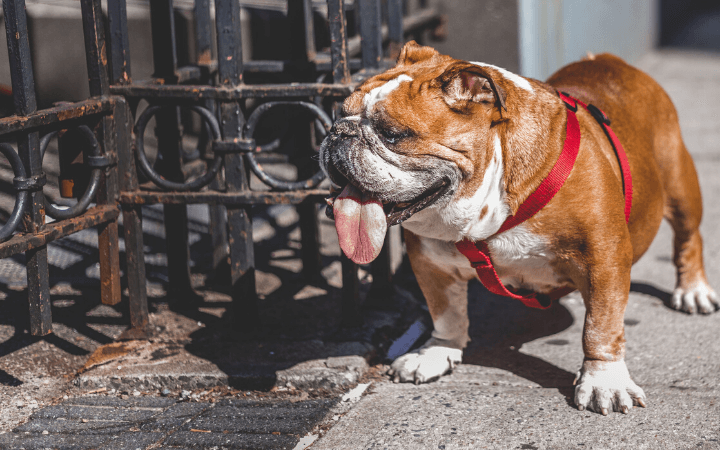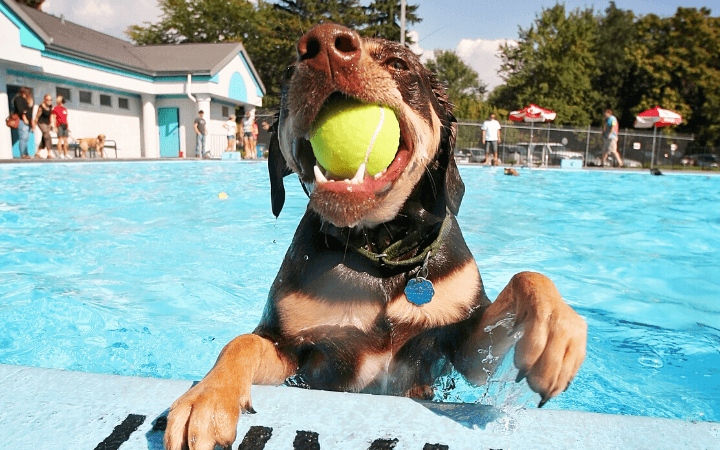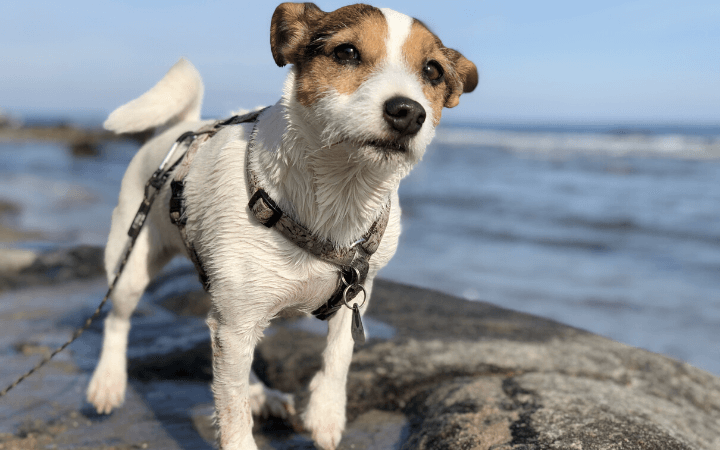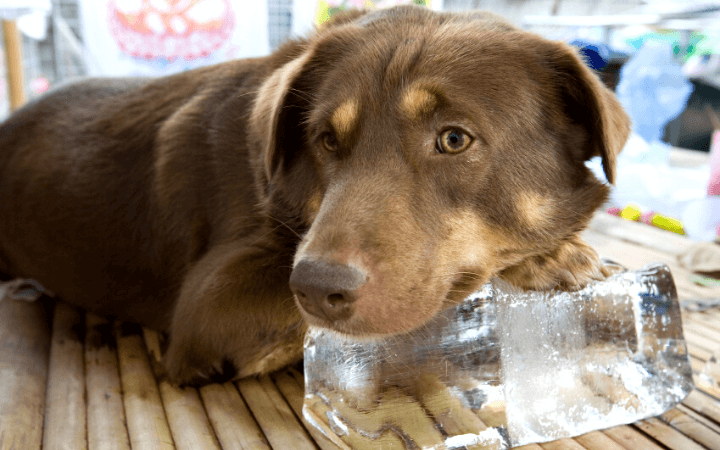Whether it is summer or just feels like it, know these important hot weather pet care tips to keep your dogs and cats safe.
Hot weather pet care – heat
Heatstroke: Overheating is the primary concern for dogs and cats during the summer. Heatstroke – or hyperthermia – can occur when a pet’s temperature reaches 104°F or higher.
Heatstroke can be fatal and dogs are particularly susceptible, but is preventable if caught and treated in time. Know the symptoms and immediate care tactics of heat stroke before your pet can be transported to the veterinarian safely.
Flat-faced pets: Pets with short muzzles like Pugs, Pekingese, Bulldogs, and Persian cats often have breathing problems. They are more prone to heatstroke since they cannot pant as effectively.
Young, elderly and overweight animals: Older pets, puppies, overweight animals, and those with heart, lung or other medical problems face a higher risk of overexertion and overheating.
Keep vulnerable pets out of the sun and heat as much as possible and watch them closely for signs of heatstroke. Know the signs of heatstroke for dogs and cats.
The car: Leaving your pet in the car – even with the windows cracked – can cause heatstroke, organ damage, and death.
Never leave your pet in the car even in slightly warm weather or for short periods of time. The temperature in a mostly closed car rises very quickly, even if the windows are ajar.
Download these flyers to educate others about the dangers of leaving pets in the car. Leave your dog or cat at home if you are going someplace where pets are not permitted. Not only will your pet be more comfortable, but you will potentially save her life.
Cool-off opportunities: Fans, ice cubes in water bowls, and pupsicle or catsicle treats are great ways to cool your pet. Do not rely primarily on fans, however, since they are less effective at cooling pets than people.

Cool spots indoors: Air conditioning creates an ideal escape from the summer heat for both pets and humans alike. But if you do not have air conditioning, give your pet access to cool spots in your home – like tiled floors and rooms that do not get much sun.
Make sure water bowls remain full and available to your pet at all times.
Outdoor time: A pet can easily overexert herself in hot weather. Counter this with periods of rest between play in combination with plenty of hydration.
Schedule walks or outdoor play time in the early mornings – and evenings when the sun has set – rather than midday. If your pet is on a run line, make sure there are no opportunities for him to get tangled.
Provide a well-built, well-ventilated dog house that provides adequate shade for a dog who spends extended time outdoors. Make sure to have a generous bowl of fresh water at all times.
However, pets should never be outside unsupervised for any extended period of time, regardless of the weather.
Pavement: Hot pavement can burn paw pads. Take your pet for walks in the morning or evening hours when it is cooler, walk in the grass, or utilize dog boots or socks.
Pet-safe sunscreen: Consider applying sunscreen on your pet’s ears and nose before taking her outside. Pets with lighter skin, and short or thin hair, are more prone to sunburn and skin cancer.
Consult your veterinarian before using any sunscreen product on your pets, particularly for cats since some products contain ingredients that are not safe for them.
Grooming: Trimming long hair can help keep your pet cool, but shaving can do more harm than good. The layers of a pet’s coat helps protect him from overheating and sunburn.
Groom your dog or cat more regularly instead to remove loose fur that can contribute to overheating. Consult a groomer or your veterinarian if you are unsure how to manage your pet’s fur in the warm weather.
Hot weather pet care – water
Hydration: Keep fresh water readily available to your pet, both indoors and outdoors. Tap, filtered or bottled water is safer than having your pet seek alternative sources, such as puddled or ponding water, streams or runoff, all of which can contain harmful toxins.

Bring extra water and a travel bowl when you are out walking, hiking, at the beach, at a park or otherwise away from home with your pet.
Never give your pet salt water, which can cause diarrhea, vomiting, and dehydration.
Hosing down: Spraying your pet down with a garden hose is a quick way to lower her body temperature, but excess hose water heats up in the sun and can burn your pet. Let the excess water spray out, then check the temperature with the back of your hand before using on your pet.
Kiddie pools: These can be a good backyard cooling alternative, but they heat up during the day and water needs to be replaced regularly. Empty the pool when it is not in use since still bodies of water attract mosquitoes to lay their eggs.
Always supervise your pet when in or near any body of water, no matter how small.
Boating: Make sure your dog can swim before taking him on a boat, and invest in a canine life jacket for an added measure of protection.
Pool and beach safety: Never leave your pet unattended by the poolside or other open bodies of water. Even capable swimmers can have accidents, and natural bodies of water have other threats, like riptides, rogue waves and undertows.
Since dogs can often swim for extended distances and become too tired to return, use a brightly colored canine life vest so that you can easily spot him in open water.
Hot weather pet care – pests, allergens and toxins
Pests: Fleas, ticks, mosquitoes and tapeworms are more problematic during the summer, and all present serious health dangers to dogs and cats.
Keep your pet up-to-date on preventatives and check for pests after your pet has been outside. Know how to check your pet for ticks and remove them safely.
Allergens: Summer is prime time for allergic reactions that can cause itchiness and hot spots.
Insect bites and grass allergies are common irritants, but talk to your veterinarian if your dog or cat is especially itchy, or has sores that will not heal, dandruff or bald patches. Some pets are allergic to flea bites; even a single bite from a passing flea can cause them to scratch excessively.
Pavement puddles: Never let your pet drink water off the street.
Cars leak more antifreeze than usual during the summer months, and antifreeze consumption is extremely dangerous and highly lethal for both cats and dogs.
Grass: Keep your pet off of lawns and green areas marked with fertilizer signs; eating plant food, fertilizer and insecticides can be fatal. As a general rule, it is good to wipe down your pet’s paws after a walk or any period of time outside.
Hot weather pet care – activities and travel
Fireworks: Fireworks and other loud, celebratory displays can frighten and even endanger your pet. Every year, shelters take in animals that ran away from fireworks, and many dogs and cats are hit by cars when they panic, and escape the safety of their homes.
Read our Fourth of July pet safety tips for ideas on how to keep your pets safe and stress-free during holiday celebrations.

Barbecues: Bones can cause gastrointestinal irritation or obstructions, while eating fatty food scraps can be bad for your pet’s health. Other cookout staples like charcoal, alcohol and citronella all are hazardous to pets.
Vacationing: Expert pet behaviorist and trainer Andrea Arden offers tips on traveling with your pet. It including the types of pets who do best on trips and those you should consider leaving at home with a trusted sitter or boarder.
Hot weather pet care – severe weather
Disasters and emergencies: The summer brings severe weather like thunderstorms, flash floods, wildfires, drought and hurricanes – and not all disasters announce themselves with time to spare.
Make sure you have an emergency plan for your pet, as well as an up-to-date emergency kit in case of natural or manmade disaster.












These are some great tips. I’ve found this article to be very informative. Summers are always troublesome for dogs because some breeds are more sensitive to heat than others. That’s why special care is required. I absolutely loved your grooming tips! I’ve seen many dog owners shave all the hair, which can be harmful. A dog’s hair keep’s him from getting sunburned, thus protecting the skin. Thanks for sharing! Cheers!
Excellent, I have two dogs and they are very cute. I love them very much. but they seems to me tired in the summer. You have shared some awesome tips that are helpful to keep our dog sound, especially in the summer.You have also included some important tips for severe weather like thunderstorms, flash floods, wildfires, drought, and hurricanes. Very appreciating post!
Thank you for your blog. I have Pomeranian, I am in a confusion of shaving my dog in summer, but this blog helped me to go in a right way.
You must be happy to know that, I have shared this post with my friend John and he loved it. He loves puppies so much and I’ve never seen him he did any mistake to take proper care of his 3 dogs. They are also too much cute. Thank you for such interesting post.
I keep a cold cloth in the freezer, and apply on his head, after awhile he knock it off. but I know he is cool, does hate the noise of the fan, so he moves away from the noise
Taking notes. Thanks for sharing these ones. Don’t ya leave your dogs inside your cars fellas, might roast them up in summer times! If you love ’em, bring ’em with you!
Awesome! I have a dog and he got irritated in summer season. I tried a lotto chill him out during this season but can’t made it. I am going to try these factors this summer for him. Nice work! thanks for sharing.
we just had a very hot week in central ohio. my dogs drank so much water…surprised we didn’t have a drought because of that!
Very Nice Post. Never, ever leave your dog in the car. Make sure your dog has unlimited access to fresh water. You gave very fine tips. Thanks for sharing.
Great Article and veru usefull for pet owners. Pet care is very must in summers because some breeds are very sensitive and they need special care in summers. Thanks for giving us these useful tips.
Really great post!. This post has provided me some easy to go tips to care your pets in this scroaching heat of summer. One needs to be careful and watchful this summer to protect your pet and care them during this summer.
Your blog is awesome and very useful for all pet owners. Really, all pets like dogs and cats need special care in summer. We should also give veterinarian care to pet if we want to keep our pets in the best of health. We should also take care from insects like mosquitoes, ticks.
Good article. I have a friend who left his dog on a tether a few minutes. When he returned, the dog had hanged itself. If you must use a tether, use a harness. Also, beware of collars with plastic buckles. Strong dogs can run through them. to shear off the barbs .
also